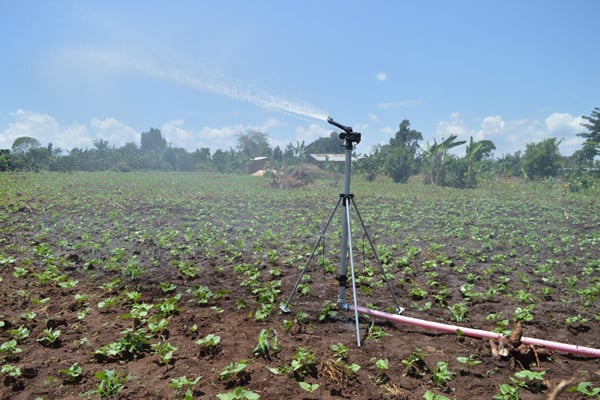Over 200 Adjumani farmers to benefit from govt irrigation equipment

South Sudanese refugee Peter Taban irrigates his crops in Northern Uganda on January 25, 2022. PHOTO/MARKO TAIBOT
What you need to know:
- Adjumani is among the 95 districts to benefit from the UGIFT.
More than 200 farmers comprising of refugees and nationals in Adjumani District will benefit from small scale irrigation equipment from the Uganda Intergovernmental Fiscal Transfer program (UGIFT) to adapt to the climate change challenges.
The program is funded by the Government of Uganda with support from the World Bank in collaboration with the Ministry of Agriculture, Animal Industry and Fisheries as the lead ministry, coordinated by its Department of Agricultural Infrastructure Mechanization and Water for Agricultural Production (DAIMWAP) and implemented by the Production and Marketing department at the District level.
Speaking to the Monitor on Wednesday, Mr Pious Jurugo the Agriculture engineer in Adjumani said under the program aimed to improve agricultural productivity, the district has so far received Shs176million for software components.
“This financial year, 205 farmers will be supported. The qualification to be considered for a farmer is to have at least two acres, access to a source of water not more than 700meters away and be willing to co-fund for the projects,” Mr Jurugo said.
He explained that: "The program will be co-funded by the farmer and the government so, if a farmer chooses solar pumping irrigation, the farmer contributes 25 per cent of the cost and the government provides the rest of the funding but for engine pumping systems, the farmers contribute 75 per cent of the cost, and the government funds 25 per cent.”
Jurugo emphasized that, as part of the programs, the district will open three demonstration farms of irrigation in the sub counties of Dzaipi, Pakele and Ukusijoni.
The Adjumani chairman Ben Anyama noted that the inclusion of the district in the irrigation project will uplift small-scale farmers to commercial farming and improve the nutrition levels in area at a time when UNHCR and the World Food Programme (WFP) have reduced food ration to refugees.”
The WFP through the Alliance Forum for Development (AFOD) Uganda has been offering mini-irrigation equipment to refugees and host communities in groups to grow vegetables to fight food insecurity.
'Tight conditions'
Peter Taban,35, a refugee with six children from Maaji Refugee settlement, who had been benefiting from the offer by AFOD welcomed the idea by the government to assist them to grow vegetables throughout the year.
Taban said, he embraces irrigation after encountering losses in 2021 due to the prolonged dry spell that left him without food.
Taban added that, since he fled South Sudan in 2016 due to the civil wars, he had been hiring an acre of land from the community at the cost of Shs100,000 but he has not been utilizing the land to the maximum due to the tight conditions and prolonged dry season.
“I have decided to join the communal vegetable growing because life has become difficult after the reduction in the food ratio, food has not been enough for me. I am hopeful with this project, I will be able to improve the nutrition level of my children and pay school fees next year,” Mr Taban explained.
Adjumani is among the 95 districts in the second phase, including all the 11 districts of West Nile benefiting from the UGIFT after the first phase where 40 districts benefited in 2021.




